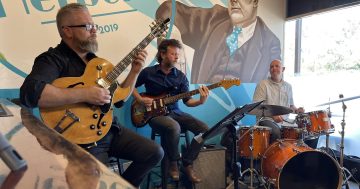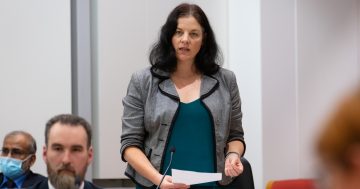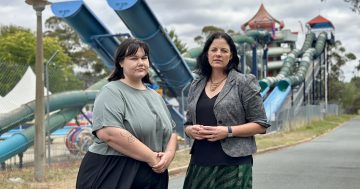
Canberra’s live music venues and artists need tangible help to keep going in a difficult environment, say the Greens. Photo: MusicACT.
Four more entertainment precincts would be created across the ACT under an ACT Greens plan to foster new venues and save Canberra’s struggling live music scene.
The election pledge to rebuild the sector would see precincts developed in Belconnen, Molonglo, Woden, Tuggeranong and at EPIC, to add to those already established in Civic and Gungahlin.
Ginninderra MLA Jo Clay said these precincts would be subject to specific building quality standards and soundproofing measures to ensure residents or businesses were not exposed to unreasonable or unexpected levels of noise.
The pledge also includes a plan to address skyrocketing public liability insurance and the appointment of an Industry Development Officer to support artists to professionalise in their field.
Ms Clay said Canberra had a dynamic and diverse local music scene but artists and venues were struggling to survive post-COVID.
She said meagre revenue from streaming series meant many local musicians could not afford to live in Canberra, let alone perform here.
“Our venues are struggling too – it’s hard to sell tickets and drinks, and many are struggling to pay rising insurance costs,” she said.
“We saw a particular example of the struggling industry with Groovin’ the Moo cancelled this year – but smaller venues are struggling every day.”
Ms Clay said government needed to get the settings right for entertainment precincts so they could thrive.
“We also need to ensure these precincts are set up to be vibrant, attractive places for people to go to – that means good public transport, late-night food and hospitality options, good lighting and an atmosphere that brings the area to life,” she said.
Ms Clay said some venues had suffered a tenfold increase in premiums and excess in a market without competition, with many close to breaking point.
She said the sector was hampered by there being only one reinsurer in Australia.
All levels of government and the sector were looking at three ways to improve the situation: negligence law reform, similar to what happened in the motor vehicle area to provide competition; a risk management tool that could be given to venues so they could negotiate smaller premiums; and government partially underwriting the cost of premiums or becoming partial insurer for venues.
All of these remain in development but Ms Clay believed they would make a difference.
“I am very confident that between those three tools, all of which are ACT Government-level tools, we can land some genuine meaningful help that means public liability is not the reason any of our good venues should go out of business,” she said.
Ms Clay said it had taken too long to get entertainment precincts in place and the middle of the planning review would have been the best time to do it.
She acknowledged that setting up a precinct would not see venues suddenly spring up.
“You’re not going to magically change planning and government settings and have new amazing venues appear overnight, but making a real commitment and making some of those tangible changes will both reduce the problems and barriers for existing venues,” she said.
“It’s also a really good signal for people setting up.”
A paid Industry Development Officer within ArtsACT or MusicACT would help artists navigate the business side of their work, giving them the skills to manage their gigs and money and identify new opportunities such as corporate work and government contracts and grants.
The Greens say this position will cost $100,000 a year but other parts of the plan would come from existing resources.
Musician Harini Rangarajan, who is also a Greens candidate for Murrumbidgee, said creating new entertainment precincts would give musicians a platform within Canberra so they received the recognition they deserved.
“Friends of mine who live outside of Canberra are always talking about how Canberra has ‘no culture’, but we do,” she said. “We have some of the most talented musicians in Australia right now who are left to play in a handful of Canberra’s remaining live music venues.”




















